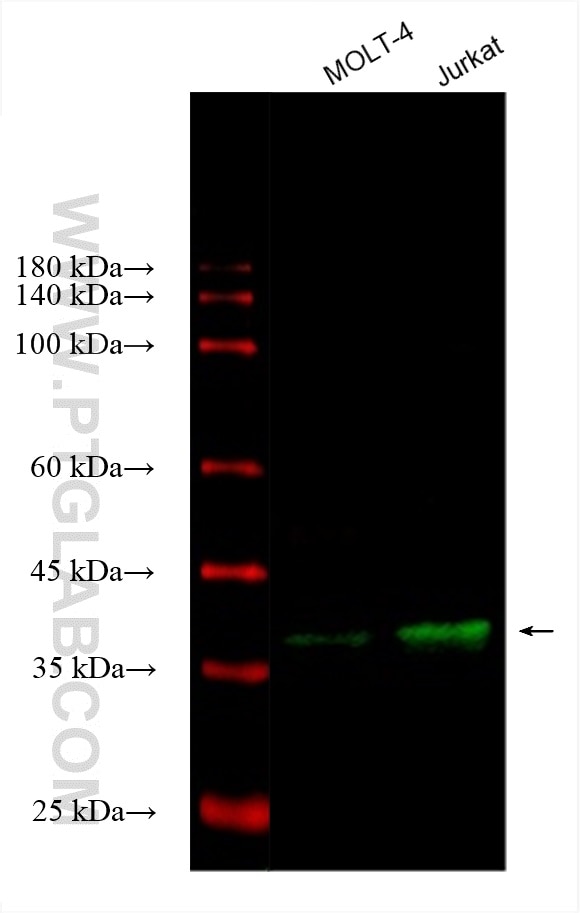Tested Applications
| Positive WB detected in | MOLT-4 cells, Jurkat cells |
Recommended dilution
| Application | Dilution |
|---|---|
| Western Blot (WB) | WB : 1:500-1:1000 |
| It is recommended that this reagent should be titrated in each testing system to obtain optimal results. | |
| Sample-dependent, Check data in validation data gallery. | |
Product Information
CL488-66257 targets CD1d in WB applications and shows reactivity with human samples.
| Tested Reactivity | human |
| Host / Isotype | Mouse / IgG1 |
| Class | Monoclonal |
| Type | Antibody |
| Immunogen |
CatNo: Ag11108 Product name: Recombinant human CD1D protein Source: e coli.-derived, PET28a Tag: 6*His Domain: 18-302 aa of BC027926 Sequence: SAEVPQRLFPLRCLQISSFANSSWTRTDGLAWLGELQTHSWSNDSDTVRSLKPWSQGTFSDQQWETLQHIFRVYRSSFTRDVKEFAKMLRLSYPLELQVSAGCEVHPGNASNNFFHVAFQGKDILSFQGTSWEPTQEAPLWVNLAIQVLNQDKWTRETVQWLLNGTCPQFVSGLLESGKSELKKQVKPKAWLSRGPSPGPGRLLLVCHVSGFYPKPVWVKWMRGEQEQQGTQPGDILPNADETWYLRATLDVVAGEAAGLSCRVKHSSLEGQDIVLYWGGSYTSM Predict reactive species |
| Full Name | CD1d molecule |
| Calculated Molecular Weight | 335 aa, 38 kDa |
| Observed Molecular Weight | 40 kDa |
| GenBank Accession Number | BC027926 |
| Gene Symbol | CD1d |
| Gene ID (NCBI) | 912 |
| RRID | AB_3084226 |
| Conjugate | CoraLite® Plus 488 Fluorescent Dye |
| Excitation/Emission Maxima Wavelengths | 493 nm / 522 nm |
| Form | Liquid |
| Purification Method | Protein G purification |
| UNIPROT ID | P15813 |
| Storage Buffer | PBS with 50% glycerol, 0.05% Proclin300, 0.5% BSA, pH 7.3. |
| Storage Conditions | Store at -20°C. Avoid exposure to light. Stable for one year after shipment. Aliquoting is unnecessary for -20oC storage. |
Background Information
CD1d is a member of the CD1 family of transmembrane glycoproteins, which are structurally related to the major histocompatibility complex (MHC) proteins and form heterodimers with beta-2-microglobulin. CD1d is an antigen-presenting protein that binds self and non-self glycolipids and presents them to T-cell receptors on NKT cells. When activated, NKT cells rapidly produce Th1 and Th2 cytokines. The molecular weight of unglycosylated CD1d is 38 kDa, while glycosylated form of CD1d is 48-55 kDa.
Protocols
| Product Specific Protocols | |
|---|---|
| WB protocol for CL Plus 488 CD1d antibody CL488-66257 | Download protocol |
| Standard Protocols | |
|---|---|
| Click here to view our Standard Protocols |




